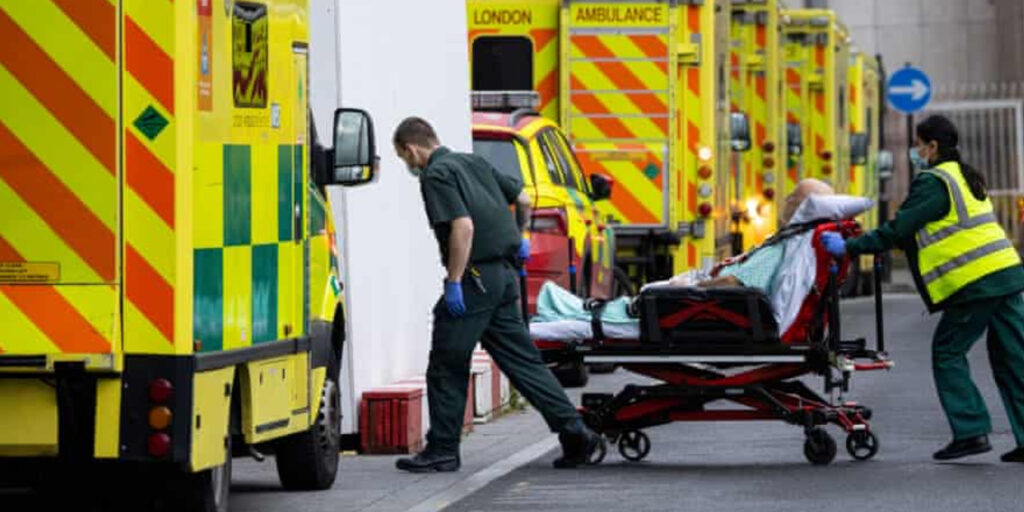Three in four people in the UK fear being left on a hospital trolley in a corridor or waiting too long for an ambulance after dialing 999, raising concerns that the NHS is facing “a crisis of public trust.”
A new Ipsos survey found that 77% of respondents worry about a shortage of A&E beds, while 70% fear they won’t receive care at their GP surgery.
Public Reluctance to Seek Emergency Care Grows
The survey reveals that one in three people (34%) are hesitant to seek help at A&E due to concerns about overcrowding. Even more alarming, 43% of respondents stated they would prefer to take a taxi to the hospital rather than wait for an ambulance, fearing delays in emergency response times.
Dr. Adrian Boyle, president of the Royal College of Emergency Medicine, called the findings “worrying and frightening in equal measure.” He added, “Much as the NHS is valued, this research shows that people are losing trust in its ability to care for them in emergencies.”
Patients Feel Forced to Delay Seeking Help
Rachel Power, chief executive of the Patients Association, described the results as “a shocking level of public fear” regarding urgent and emergency care. “No one experiencing a health emergency should have to think twice about calling for an ambulance or going to A&E, yet many feel they have no choice but to delay seeking help or find alternative transport.”
The NHS has been struggling for years to meet waiting time targets for emergency care, routine hospital treatment, and ambulance response times. Patients requiring mental health support often experience long waits, while access to NHS dental care remains limited.
Overcrowded A&Es Put Patients at Risk
The problem of “corridor care” in A&Es has become so severe that some patients have died unnoticed in overcrowded emergency departments. Last month, the Royal College of Nursing revealed that overwhelmed hospital staff often struggle to monitor patients, leading to routine harm.
Concerns over delayed care were reinforced by the case of 91-year-old Dorothy Reid, who died after refusing to return to A&E following a previous visit where she was left sitting on a chair overnight despite having a broken back. An inquest into her death heard that she refused treatment due to fear of facing the same conditions again. The coroner ruled that if she had received timely care, her life might have been saved.
Medical Experts Warn of Growing Public Fear
Dr. Nick Murch, president of the Society for Acute Medicine, warned that delayed or avoided emergency visits could lead to serious harm. “There is growing concern among clinicians that people who are ill are staying at home rather than seeking urgent care due to fears of long waits or receiving corridor care.”
Prof. Nicola Ranger, general secretary of the Royal College of Nursing, said “public anger is palpable” over the NHS’s inability to deliver fast, high-quality care. She noted that frustration with delays often leads to verbal and physical abuse against healthcare workers.
“The government’s upcoming ten-year NHS plan must restore public confidence,” she urged.
Survey Highlights Public Frustration
The Ipsos research found that 81% of respondents feel sadness over the state of the NHS, while 71% feel angry. Less than half (47%) believe the NHS provides taxpayers with good value for money, though 58% still think it offers a high standard of care.
When asked about their first thoughts regarding the NHS, the most common responses were “long waiting times” (57%), “understaffed” (51%), and “delays” (27%). Only 22% associated the NHS with “high quality of care.”
Government Response to Public Concerns
NHS England acknowledged the pressures facing the service but did not directly respond to the survey findings. A spokesperson emphasized that despite challenges, people should always seek care when needed, whether through their GP, NHS 111, or A&E in a life-threatening emergency.
The Department of Health and Social Care said: “People are right to be angry. Patients are being let down, and taxpayers’ money is being wasted. The NHS is broken, but it’s not beaten.”


